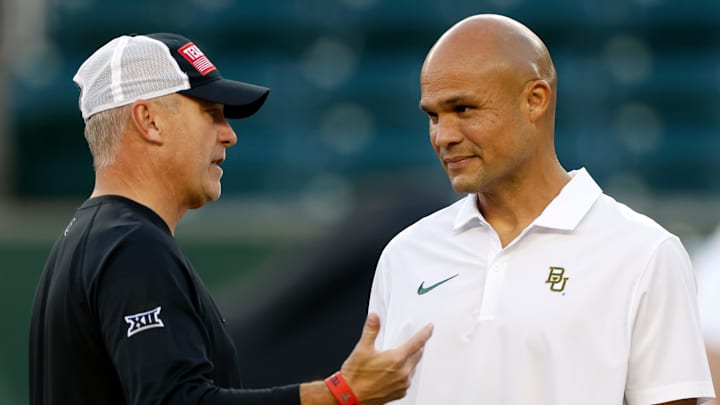The days of giving a college football head coach four or more years to turn a program around are likely over. That's why there's so much turnover in the sport these days.
There is simply too much money being spent on college football programs for a struggling coach to be granted several years to show positive results. Texas Tech fans should know that as well as any fan base in America.
Current Texas Tech head coach, Joey McGuire, was hired in the fall of 2021 to replace Matt Wells who was fired just 2.5 seasons into his tenure in Lubbock. Once it became obvious that the program wasn't likely to turn around under Wells' leadership, Texas Tech athletic director Kirby Hocutt made the swift decision to terminate Wells despite the fact that the Red Raiders had a winning record at the time.
That was a far cry from the way Wells' predecessor, Kliff Kingsbury, was treated. More of an emotional hire for the university, the sentimental former Red Raider quarterback got six years to try to build a winning program in Lubbock but many believe he should have been fired after season four or five.
Most coaches aren't afforded that long to try to bring results to their university. That's because the prevalence of N.I.L. collectives and the transfer portal have caused many donors and administrators to ramp up their immediate expectations.
In the Big 12, 10 of the sixteen head coaches have been with their current programs for three years or fewer. That doesn't mean that there aren't some among that group who are on the hot seat already, though. So let's look at three coaches in this conference who should feel the heat in 2024.
Dave Aranda's tenure at Baylor is a stark reminder of how fleeting success can be in college football. In 2020 he took over in Waco and after a 2-7 debut season, he guided his program to the 2021 Big 12 Championship and a 12-2 season. At that point, he was one of the rising stars in college football.
Since then, though, he's managed to go just 9-16 combined the past two seasons. That includes a dreadful 3-9 season last fall.
The stoic and unemotional Aranda has come under fire for his lack of...well...fire. Not one to show emotion on the sidelines, he often seemed lifeless last season as his team struggled and that's not what fans want to see. They want to see a coach who comes across as being just as upset as they are when the program struggles, but that isn't Aranda's way of operating.
A sign that Aranda is feeling the heat is that he's hired a new offensive coordinator in Jake Spavital while also taking over the duties of calling the defensive plays himself. If those changes don't yield positive results in 2024, he could be out of work before the end of the year.
It might be a touch premature to put Cincinnati's Scott Satterfield squarely on the hot seat after just one season in charge of the Bearcats. However, he will likely feel the heat at some point in 2024 because his program is expected to struggle for the second year in a row.
Last season, Satterfield guided Cincy to just a 3-9 record. That included a mark of just 1-8 in Big 12 play.
This year, he can't afford to struggle that mightily again. However, his program will enter this season expected to be one of the worst teams in the conference.
If Cincinnati does indeed put forth another losing record, it will be the third season out of five as a head coach in which Satterfield has been below .500 since he left Appalachian State where he made his name. Therefore, he would be best served to show some signs of life within his program this fall because each year that Cincinnati languishes is another year in which the program falls further behind in the Big 12.
Certainly, Colorado is going to give Deion Sanders more than two seasons to fix what was one of the most dormant programs in America prior to his arrival. However, the reality is that the brash head coach must make significant progress in year two, or else his reputation will begin to take a serious hit.
Sanders' bravado upon taking the Colorado job did generate significant buzz but it also sped up the expectations for the Buffaloes. Unfortunately for "Coach Prime" his initial season in Boulder was a flop as his team went just 4-8 overall and 1-8 in PAC 12 play.
Remember, hiring Sanders was an experiment by Colorado. It was a roll of the dice that could go either way given that he had never led an FBS program.
Since then, he's built his program his own way, mostly by playing the transfer portal game as lustily as any coach in America. But if he struggles to another losing season this fall, it will be a concerning sign for the future of Colorado football, especially with star DB/WR Travis Hunter and star QB Shedeur Sanders both certain to be in the NFL in 2025. So though Sanders won't lose his job this season, he should still be feeling the pressure to show that he is more than just big talk.
